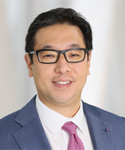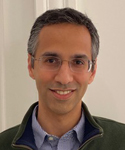
Dr. Choi
Interview with the Investigators
It was truly a pleasure to speak with the corresponding authors of this article to better understand the value their findings bring to the field. Jaehyuk Choi, MD, PhD, Jack W. Graffin Professor, The Feinberg School of Medicine, Northwestern University, Chicago, Illinois, and Deepak A. Rao, MD, PhD, assistant professor of medicine, Division of Rheumatology, Inflammation, and Immunity, Brigham and Women’s Hospital and Harvard Medical School, Boston, Massachusetts, were kind enough to simplify their incredible research.
TR: Can you summarize your findings in simple language for our readers?
Dr. Rao: Lupus is driven by a pathologic T cell-B cell response that produces autoantibodies that mediate injury in multiple tissues. We have been searching for methods to disrupt the function of the T cells that drive B cell activation and antibody production in SLE—in particular TPH and TFH cells. We discovered that one specific transcription factor, AHR, can strongly inhibit T cell differentiation into TPH and TFH cells. Further, we found that type I interferon, a cytokine known to be produced excessively in lupus, promotes TPH and TFH cell generation in part through suppressing the actions and downstream effects of AHR.
Dr. Choi: We think there are chemical and cytokine imbalances in the blood of patients with SLE, including excess amounts of type I interferon and low levels of AHR activity. This chemical imbalance leads to the upregulation of pathogenic B helper-T cells (TPH and TFH cells).
TR: Why should practicing rheumatologists and patients living with lupus be excited about these findings?

Dr. Rao
Dr. Rao: This study reveals a new potential therapeutic strategy to treat SLE. We aim to use small molecule activators of AHR, directed specifically towards T cells, as a treatment to suppress the pathologic T cell response in lupus and to reprogram those T cells towards benign or even protective functions.
TR: What are the next steps in terms of future research? Are there currently studies underway for drugs that stimulate AHR?
Dr. Rao: The work so far is performed largely in vitro using T cells from patients with SLE or healthy controls. We do not yet know what will happen when a strategy like this is tried in patients. We are currently working to design strategies to selectively activate AHR in T cells without broader effects on other cells or tissues. We are also evaluating to what extent this imbalance in T cell responses is seen in other autoantibody-associated autoimmune diseases.

